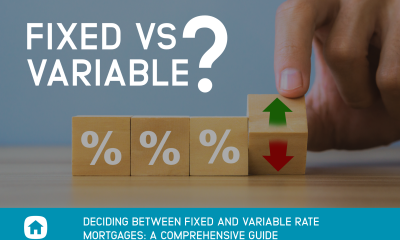5 Mortgage Secrets
THE PENALTY COVER UP Mortgage Secret 3 of 5

WHAT IS A MORTGAGE PENALTY?
Canadian mortgages are all set up with a specific term, usually five years, a mortgage penalty happens when you change the terms of that mortgage before the expiration of that term.
This includes refinancing your mortgage (debt consolidation or applying for a lower rate), paying down more of your mortgage than whats allowed within your repayment terms, and even when you are moving to a new home.
Essentially, if you try to change any part of your mortgage for any reason, you are likely going to have to pay the penalty.
Whatever the reason, breaking your mortgage happens!
When selecting a mortgage although everything seems stable and that you don’t think you will need to break your mortgage term, things change, and in today’s hectic world, when they do change it usually happens fast!
Breaking a mortgage could be for any of the following reasons:
- Health issues / Family health issues
- Need money to repair damages to your home
- Changing jobs / Lost job / Laid off
- Maternity leave
- moving to a new home
- Investing in a new business, real estate, stock/bond/mutual fund
- Bridging a slow time in your business
All the above reasons are pretty common things that happen in life. Regardless of the reason when someone breaks their mortgage (which happens often), the bank charges them penalties.
WHAT ARE THE MORTGAGE PENALTIES FOR?
When you return the borrowed money earlier than agreed, the bank has to find another borrower for the remaining term.
Banks don’t print money. They have to borrow it from somewhere. Whether that’s from the government (overnight lending rate) or their customers, the money has to exist, and the banks need permission to lend it out.
They get this permission by offering investments like GIC’s, Mortgage Backed Securities and other investment products. And here’s the catch, when you break your mortgage, the bank doesn’t get to break the investment contract it used to give you the money in the first place.
INTEREST RATE DIFFERENTIAL (IRD)
So here is an example, the bank issues a GIC at 4% (I know that is a high rate, and not possible now, but hear me out) they then offer you a mortgage at 5%. 3 Years later rates drop to 3% on the mortgage and you decide to go get a new mortgage so you can save some money.
You break your mortgage, and get your new rate but the bank is still on the hook to honour that 4% GIC that they issued. So they went from earning 1% to losing 1% on your mortgage every year.
Mortgage Penalties are used to protect the banks from this type of risk. They can now charge a penalty to recapture the 1% loss when you break your contract.
This type of penalty is called an Interest Rate Differential or IRD.
3 MONTH INTEREST PENALTY
Now when this happens in reserve and interest rates are rising. Meaning the interest rate you have and the new interest rate the bank will be lending at is higher, then they are supposed to charge you a 3-month interest penalty.
The 3-month interest penalty is supposed to be enough time for the bank to find a new person to borrow that money again.
What you need to know about mortgage penalties!
Mortgage Penalties have the most significant financial impact on your mortgage next to the actual rate.
Even though they are only a potential expense, they need to be considered at the time you are selecting your lender because
- Mortgage Penalties using an IRD (interest rate differential) can be HUGE;
- Banks don’t calculate Mortgage Penalties in the same way; some lenders are better;
- Most big banks, including the top 5 banks in Canada use their POSTED RATE to calculate the penalty.
Understanding the POSTED RATE Cover Up
The POSTED RATE is the rate that is “posted” in the window of the big bank. It’s the bank’s version of MSRP (manufacturers selected retail price).
For example, as of today RBC’s Posted 5 Year fixed rate is 5.34%, but the rate you would get on a mortgage is closer to 3.74%.
The Posted Rate of your mortgage at the time when you received your mortgage should have no impact on how much your penalty should. The banks have a way of justifying this, but its just a way of increasing revenue while you have little, to no choice but to pay it.
Mortgage contracts are broken for personal reasons, like family health, job change or some other type of financial instability.
Banks hold 60% of the Canadian mortgage market, and until Canadians stand up and stop using them, they’re not going to change their policies. Canadian Association of Accredited Mortgage Professionals, CAAMP
The only reason the big banks can continue to use this corrupt calculation is their significant market share and a lack of transparency on behalf of the bank.
How much difference can there be between penalties from bank to bank?
The reason there is a difference in the calculation from bank to bank is that they use and write their own contracts. No law exists that mandates the how much a mortgage penalty can be.
But there are banks that do calculate their penalties in a way that is intuitive and fair.
The big banks base the penalty on the posted rate at the time when you signed your mortgage; the calculation looks like this:
SCOTIA BANKS Penalty Calculation
[Your rate – (current posted rate for a comparable three year term – discount received initially)] x (number of years remaining)
The lenders that treat you reasonably calculate their penalty by using your actual mortgage rate and there is no mention of the posted rate anywhere which the formula looks like this:
My Recommended Mortgage Penalty Calculation
[Your rate – the current market rate for however many years you have left] X (number of years left in term) X (Mortgage amount)
The Verdict!
With mortgage rates being so close from bank to bank, it becomes much easier to select your next bank based more on its features and policies, than just the rate alone. And as a mortgage professional it’s my job educate you on the differences between the bank’s because trying to figure this out on your own would be extremely time consuming and redundant, as I have already done all of the research for you.
In today’s fast-paced world it seems that the only real thing that remains consistent is the fact that everything changes, this should remind us that when we start making decisions today that we have the potential to affect us financially in the future that all factors should be considered.
Flexibility, now more than ever is extremely important! So although I am talking about things that may happen or consequences as a result of the situation that may occur, I feel that it’s more important to consider them and be prepared for them.
-

 Buying a Home5 years ago
Buying a Home5 years ago3 Simple Rules to follow to ensure credit doesn’t stop you from buying a home!
-

 Credit6 years ago
Credit6 years agoWhat Happens to My HELOC When I Sell My Home?
-

 Business4 years ago
Business4 years agoToronto, Ontario and Vancouver real estate boards urge suspension of open houses
-

 5 Mortgage Secrets7 years ago
5 Mortgage Secrets7 years ago5 SECRETS THE BANK DOESN’T WANT YOU TO KNOW ABOUT YOUR MORTGAGE
-

 Buying a Home6 years ago
Buying a Home6 years ago6 Reasons to get Pre-Approved for a Mortgage Early
-

 News12 months ago
News12 months agoFixed Vs Variable Rate Mortgages: Decoding The Differences To Make Your Best Decision
-

 Business4 years ago
Business4 years agoBuffett says economy is slowing amid virus fears
-

 Buying a Home6 years ago
Buying a Home6 years ago5 Steps to a Guaranteed Mortgage Approval









